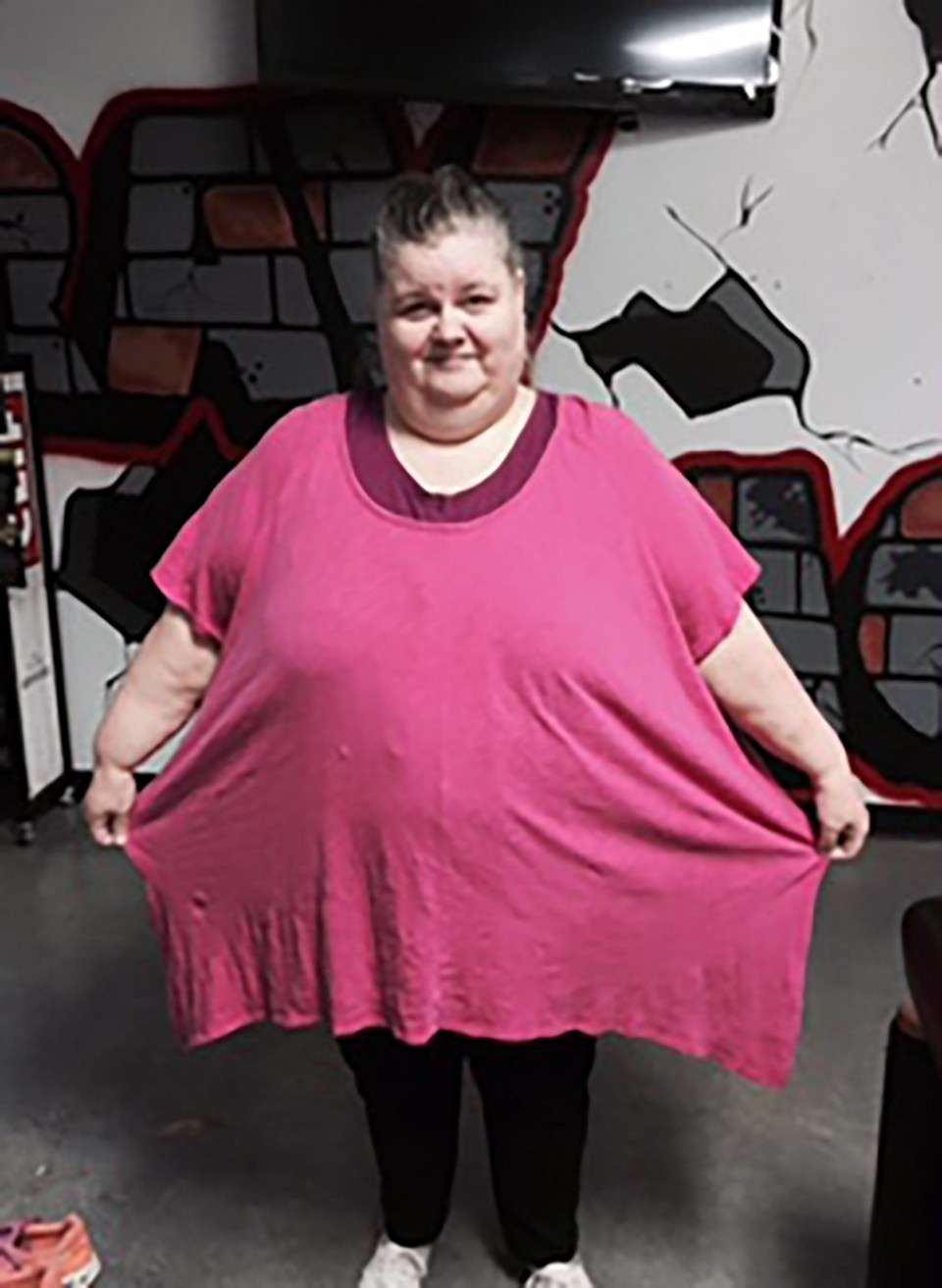Typically, when we analyze something like obesity, we tend to downplay the communitarian element. Americans value the individualist narrative, which is unfortunate when it comes to fighting addiction.
By James McWilliams
Drew Reed now (left) and after his gastric bypass surgery (right) in December 2015. (Photo: James McWilliams)
When the Reed family — Becca (51), James (57), and their son Drew (26) — decided to re-gain their health through a radical change in diet and exercise, they entered into their project with cautious optimism. Honestly, they didn’t have much to lose.
But they never could have imagined how quickly results would follow. In just two months, despite several challenges in the gym, Becca and James have each lost over 25 pounds. Drew, who is still recovering from the gastric bypass surgery he had nine months ago, dropped a hard-earned eight (normally patients at his stage gain back about seven pounds).
Becca, who no longer needs her wheelchair, has already gone off three medications — one for blood pressure, one for diabetes, and an anti-depressant — while James’ general energy level has risen to the point that he and Drew started adding extra workouts to their normal routine. Drew exalted in the fact that he was able to walk an entire 18-hole Frisbee golf course during a sweltering summer afternoon in Texas and, notably, his general mood brightened to the point that he was showing up to the workouts smiling and telling jokes.
The family could also never have imagined how personally satisfying these improvements would be. James, who isn’t one to volunteer much personal information, told me out of the blue how “this is the best I have felt in 31 years.” When I asked him if there would be any harm in deviating occasionally from his strict vegan diet, he looked at me sternly and said: “I made my deal and I’m sticking to it. I’m feeling so good I’m not going to chance it.” Becca sent me a text telling me that: “I’m alive with a future. Before I never saw more than the next few days ahead. It’s amazing to think I feel this good.” Even Drew said he was “extremely happy” about his recent progress, adding, “I was stuck after surgery, stuck, but I’m out of that now.”
With a recent report from the Centers for Disease Control and Prevention confirming the ongoing meteoric rise in obesity rates in the United States, a developing story such as the Reeds’ demands closer scrutiny. Why are they currently succeeding where so many others fail? What is it that keeps them so unwavering in their commitment to better health? What underscores their discipline?

Becca Reed in a shirt that used to fit her. (Photo: James McWilliams)
There’s no denying that each of the Reeds has demonstrated an admirable level of personal drive and willpower to stay on the path they’ve chosen. But their commitment is about more than the individual triumph over adversity. It’s also about social context. The Reeds are not only tackling a challenge with each other’s active and essential support, they’re also doing so within a community that’s reliably on hand to foster their efforts.
Typically, when we analyze something like obesity, we tend to downplay the communitarian element. Americans in particular value the individualist narrative. We’ve consistently nurtured a history and culture that associates virtue, honor, and status with individual accountability and personal choice. We relish the lone rebel, the hero outlier, the by-the-boot-straps storyline. Overcoming adversity is personal.
This cultural affinity makes for terrific movies and a lot of revisionist history, but it serves us poorly when our affliction, as with virtually every form of addiction, is one that cannot be confronted in a vacuum. Addiction to junk food is not the same as drug addiction, but it’s in the same ballpark, and thus when research shows that drug addicts who overcome addiction overwhelming do so with structured peer support and membership in tight communities, it seems safe to conclude that it bears on the quest to reverse obesity as well.
This kind of community support has been most evident for the Reeds at their gym. Their workouts, which the Reeds continue to do three times a week with their trainer, Mike “Bonebreaker” Crockett, are as much social as physical events. James and Drew, now that Drew had re-gained some of his core strength back, were now working together, actively spotting and counting sets for each other. When Bonebreaker cheered them on they would lift harder and faster, much like a runner would break into a sprint when someone hollered for him. Drew and his dad were also doing a fist bump when a set ended.
This kind of camaraderie seemed especially critical for Becca. On many occasions, she said how she “could not be doing this without James and Drew and Bonebreaker.” Her minister’s ongoing support, in addition to her parents’ bemused but still genuinely approving response to her lifestyle change all strengthened Becca’s resolve to stick to her path. Even her neurologist, whom she saw after going off her anti-depressant, cheered her on.
The same was true with James, whose colleagues in the Sherwin-Williams warehouse where he works have been nothing but approving of his decision to go vegan and exercise regularly — something they don’t see too often; his boss, who occasionally buys the team lunch, always checks with James to accommodate his diet.

Becca and James Reed with Mike “Bonebreaker” Crockett outside of a vegan restaurant in Austin, Texas. (Photo: James McWilliams)
Losing weight, and feeling more energized, Becca was also talking to more members of the gym, many of whom became interested in the family’s project. One Sunday, Becca walked into the gym — where about 18 extremely fit people were working out — and told Bonebreaker that she was going to do a hundred squats — 10 sets of 10. She grabbed her pole and started her workout, her face set in determination.
“Breath, mama!,” Bonebreaker shouted, as she steadily crunched up and down. When she reached her eighth set of squats Bonebreaker started really hyping it up. “Twenty more! Come on! Come on, Becca!” The other gym members, most of whom had heard about the Reeds, walked over and formed a semi-circle around Becca, who was now really huffing and puffing, and they chanted a countdown (10–9–8…) until Becca hit 100. Applause and hoots filled the gym. Becca, wiped out, took a seat and caught her breath.
She then looked up at the people around her. I could see in her face how deeply moved she was by the show of support. “Most people,” she said, and then stopped herself, choking up a little. Taking a deep breath, she tried again. “Most people,” and then the dam broke, releasing a torrent of tears and words. “Most people see a person like me and they run away. They don’t talk to us. They look down on us. They think if they get near us the fat will wear off on them. But not you. You all are so nice. Thank you for being so nice to me.” There wasn’t a dry eye in the room.
“I need to get some tissues for this place,” Bonebreaker said.
Granted, this was just a brief if moving moment in a lifestyle transition that’s full of challenges. But I can say with certainty that not a single person in that gym — all very fit — left thinking the same way about obesity as they did when they came in. Such awareness — that some people’s problems require the kindness and support of a village — may be just as critical to the Reeds’ ongoing success as anything that comes from within their very determined selves.





